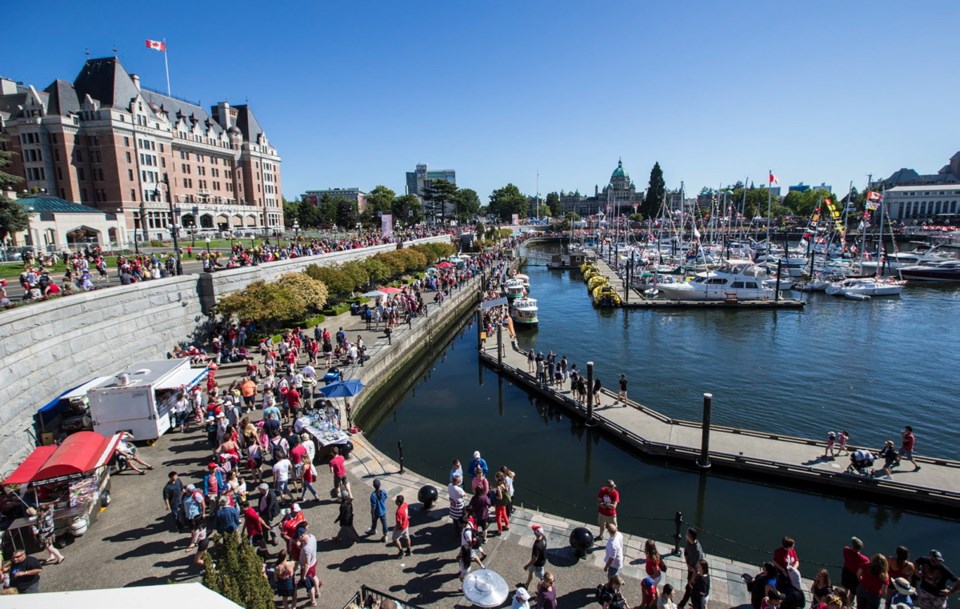A new Canadian tourism strategy is designed to boost international visits to sa���ʴ�ý during non-peak seasons by more than a million people and get visitors to see the country beyond sa���ʴ�ý’s biggest cities.
The plan, unveiled in Montreal, includes $58.5 million over two years to help communities create or improve tourism facilities and experiences.
The funding is supposed to back experiences that show off sa���ʴ�ý’s strengths — and break visitors’ fixation on just a few destinations in the nicest weather.
“Just over three out of four international visitors travel only to sa���ʴ�ý’s largest provinces, Ontario, British Columbia and Quebec, and most go to their biggest cities: Toronto, Vancouver and Montreal,” the new strategy states. “Drawing tourists to venture beyond the big cities remains a challenge for regions that want to expand their visitor economies.”
Tourism Minister Melanie Joly said the tourism measures could help tourism revenue grow by 25 per cent — to $128 billion — by 2025, while the government hopes it will create 54,000 new jobs.
Paul Nursey, chief executive at Destination Greater Victoria, said the new strategy is great news for the industry. “It’s great to see some investment in our sector ... we like the focus and attention,” he said. “Our industry is one that does not often get a lot of policy support [from Ottawa], so when we do we intend to get involved.”
Nursey said his destination marketing organization and some partners are already considering applications for some of the funding. He pointed out the goal of expanding off-season travel and farm/sea-to-table culinary tourism dovetails perfectly with Destination Greater Victoria’s own strategy.
“It’s good to have federal support for those kinds of initiatives, and we shall ride that,” he said.
Nursey said it’s unclear how much money will be available to groups such as his in Western sa���ʴ�ý, but he’s been led to believe the funding should be available quickly and could have an impact on the industry as early as next year.
Tourism industry consultant Frank Bourree said the strategy hits a lot of the right notes.
“It’s well positioned in terms of collaboration with Destination sa���ʴ�ý’s strategy, as there’s a tip of the hat to environmental issues and to Indigenous tourism, which is growing,” he said.
Bourree, principal of Chemistry Consulting, said encouraging investment in infrastructure is also a key point that aligns well considering the lack of hotel rooms and attractions. He also said the focus on shoulder seasons should align well with the goals of Destination Greater Victoria.
“It’s nice to see a commitment to the industry from the federal government. It’s a critical message they are delivering with this — that tourism is a major sector of the economy,” he said. “They haven’t paid much attention to it, and most federal governments tend to take it for granted.”
Dave Cowen, chief executive of Butchart Gardens, said he liked the amount of collaboration the new strategy calls for, which should play into the Destination Greater Victoria strategy of drawing more visitors in off seasons like Christmas and the early spring. “Anything that helps the region and helps develop off-season business helps the Gardens,” he said.
Cowen noted there are goals set to create good year-round jobs. “One of biggest growth impediments is getting good year-round staff,” he said. “But infrastructure and product development have to happen first in order to employ people year-round.”
In making the announcement Tuesday, the federal government pointed out it estimates tourism generates $102 billion in annual economic activity, supporting 1.8 million jobs and accounting for over two per cent of gross domestic product.
Joly hinted at the tourism strategy during a discussion with the Greater Victoria Chamber of Commerce last week.
At the time, she said the strategy is a way to illustrate to federal decision-makers the value of tourism as an economic driver.
In 2018, a record 21.1 million international tourists visited sa���ʴ�ý.
The new strategy is based on three pillars — building tourism in the nation’s communities, attracting investment and more work on public-private partnerships.
The government hopes to expand the country’s distinctive product lines and develop more unique attractions in all regions by investing in winter and shoulder season tourism, Indigenous tourism, rural and remote tourism, inclusive tourism and farm or sea-to-table culinary tourism.
In order to attract investment to the industry the federal government is proposing better co-ordination between all groups involved from the myriad federal agencies down to coordinating with provincial organizations.
— With files from The Canadian Press



